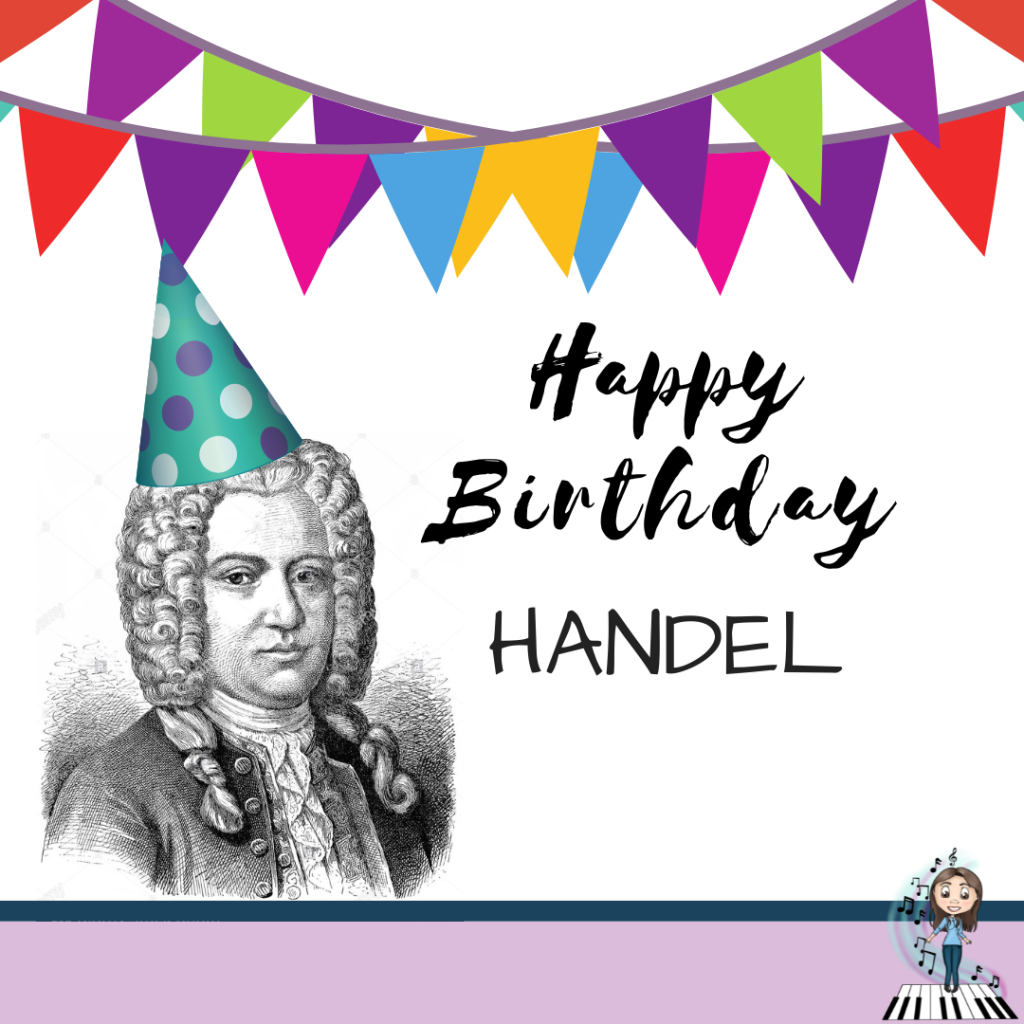
Happy Birthday Handel!
Georg Friederich Handel (later anglicised to George Frideric Handel) was born on this day in 1685. This was, incidentally, the same year as two other major composers, Johann Sebastian Bach and Domenico Scarlatti, were born.
He was a German-British (yes, you read that right!) Baroque composer who was well-known for his operas, anthems and organ concertos.
Handel was born in the German city of Halle. At this time, the arts and music were popular only among the higher levels of society – of which Handel’s family were not a member. Handel’s father (also named Georg) was a self-made man, working his way up from an apprentice barber at the age of 14 to being an eminent barber-surgeon used by the court of Saxe-Weissenfels.
It is reported that Handel’s father was “alarmed” at his son’s early inclination for music, and took steps to oppose it. This included forbidding any musical instruments in the house, and preventing Handel from going to any house where they might be found. If anything, this further stoked Handel’s passion for music. There is a popular story which says that Handel managed to hide away a little clavichord (a small rectangular stringed keyboard instrument) in a room at the top of his house, and when the family were asleep he would go up and practise.
Between the ages of seven and nine, Handel accompanied his father to Weissenfels. Here, he made his way to the court organ in the palace chapel, and surprised everyone with his playing. A major noble – Duke Johann Adolf I – overheard this performance and recommended to Georg senior that his son should be given musical tuition. Handel’s father engaged the organist at their local parish church to instruct his son. The tutor was named Friedrich Wilhelm Zachow. Because of his association with the church, Zachow was of the “old school” and was very much at home playing and teaching fugues, canons and counterpoint. But he was also aware of the developments in music taking place across Europe. When Zachow discovered Handel’s talent, he introduced him to a vast collection of German and Italian music of different styles. Many traits that are nowadays considered “Handelian” can be traced back to Zachow’s teaching.
Handel practised on the harpsichord as well as learning violin and organ, but his real affection was for the oboe. He composed a large number of pieces for this instrument throughout his career.
Zachow began to shirk some of his church duties, which resulted in Handel performing regularly on the church organ. At the age of nine, he began composing church services for voice and instruments. After just three or four years, Handel had surpassed his tutor and began looking for a new challenge.
Georg senior died in February 1697. He had always hoped for his son to become a lawyer. Handel enrolled at the University of Halle and attended lectures in the subject, but did not enroll in the faculty of law itself. Shortly after beginning his university education, he accepted the position of organist at the Cathedral in Halle. This was a one-year probationary appointment.
After this short appointment Handel travelled to Hamburg. In 1703 he accepted a position as violinist and harpsichordist in an orchestra. It is during this period that Handel’s first two operas – Almira and Nero – were produced.
Over the next few years he travelled to both Italy and England. In 1712 he decided to settle permanently in England. He received a yearly income of £200 from Queen Anne after composing the Ultrecht Te Deum and Jubilate for her, which was first performed in 1713.
In 1727 Handel was commissioned to write four new anthems for the Coronation ceremony of King George II of Britain. One of these – Zadok the Priest – has been played at every British coronation ceremony since. In 1750 he arranged a performance of his iconic Messiah to benefit a children’s home, the Foundling Hospital, in London. The performance was a great success and it was followed by annual concerts for the rest of his life. As thanks, Handel was made governor of the Hospital. He also bequeathed a copy of Messiah to the institution upon his death. Handel was a great giver to charities, and he also supported a charity which assisted impoverished musicians and their families.
In August 1750 he was seriously injured in a carriage accident in the Netherlands. A few months later one of his eyes began to fail. This was operated on, but it seems that the operation actually made things worse. By 1752 he was completely blind.
George Frideric Handel died in 1759 at his home in London at the age of 74. He was buried in Westminster Abbey, with 3,000 mourners attending his state funeral.
Handel’s music is said to form one of the peaks of the high Baroque period, bringing Italian opera to its highest development, creating new genres of English oratorio and organ concerto, and introducing a new style into English church music. His compositions include 42 operas, 25 oratorios, more than 120 cantatas, trios and duets, numerous arias, odes and serenatas, solo and trio sonatas, 18 concerti grossi and 12 organ concertos. His most famous work is the oratorio Messiah with its instantly-recognisable “Hallelujah” chorus.

